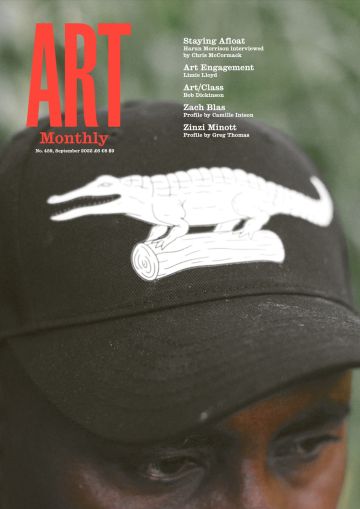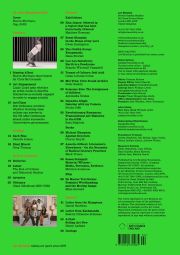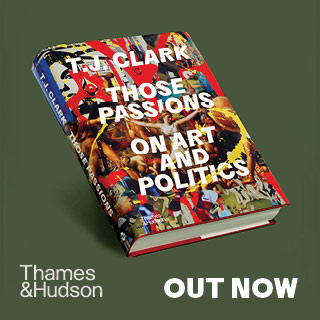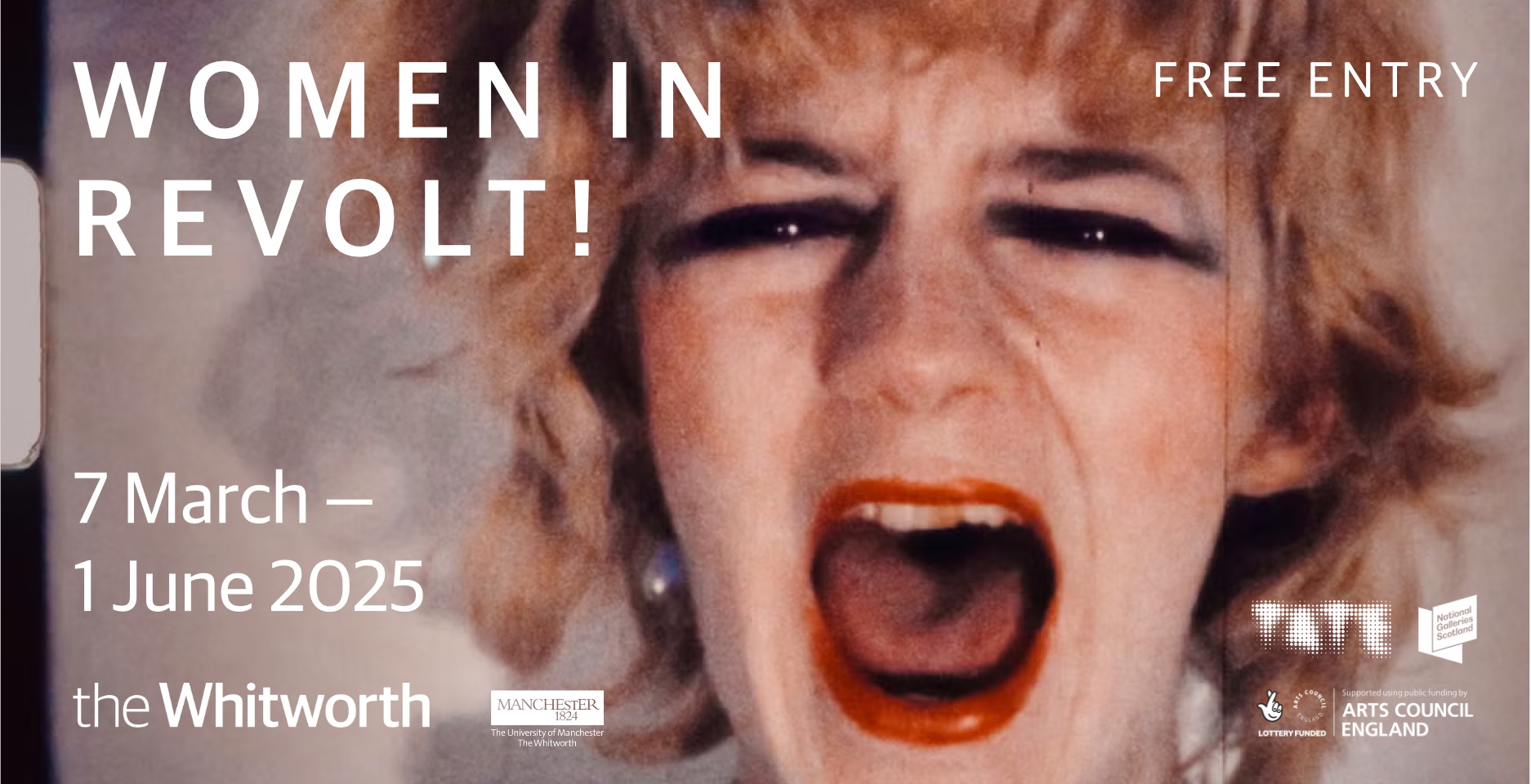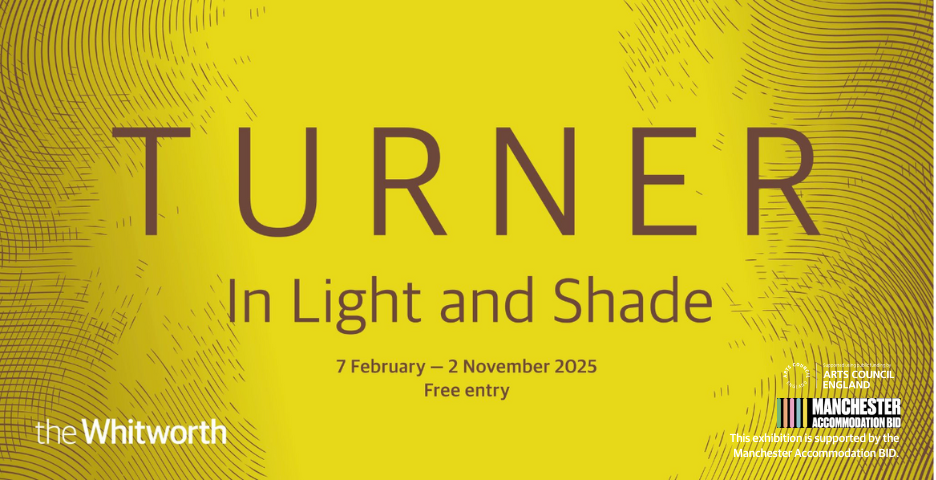Art Monthly 459
September 2022
Harun Morrison
Interviewed by Chris McCormack
Art Engagement
Lizzie Lloyd
Art/Class
Bob Dickinson
Zach Blas • Zinzi Minott
Profiles by Camille Intson • Greg Thomas
Buy Now – select:
Want to read this right now?
Get instant access to the entire back catalogue via Exact Editions from only £8.99!
Contents
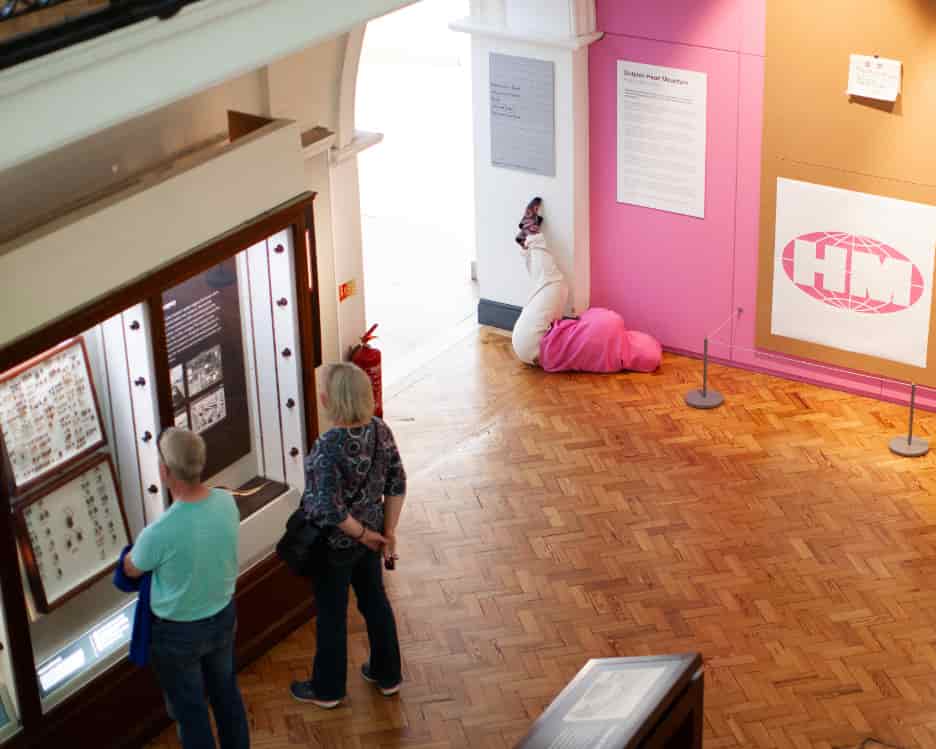
Harun Morrison and Clara Saito, Defences of Animals (Camouflage), 2022, Horniman Museum
Feature
Staying Afloat
Harun Morrison interviewed by Chris McCormack
The sales of the caps and T-shirts will support the conservation of the swallowtail butterfly in Jamaica. I try to question what it could mean to extract from a symbol of extraction. Can this ecology of images aid the biological web in an environment such as Jamaica?
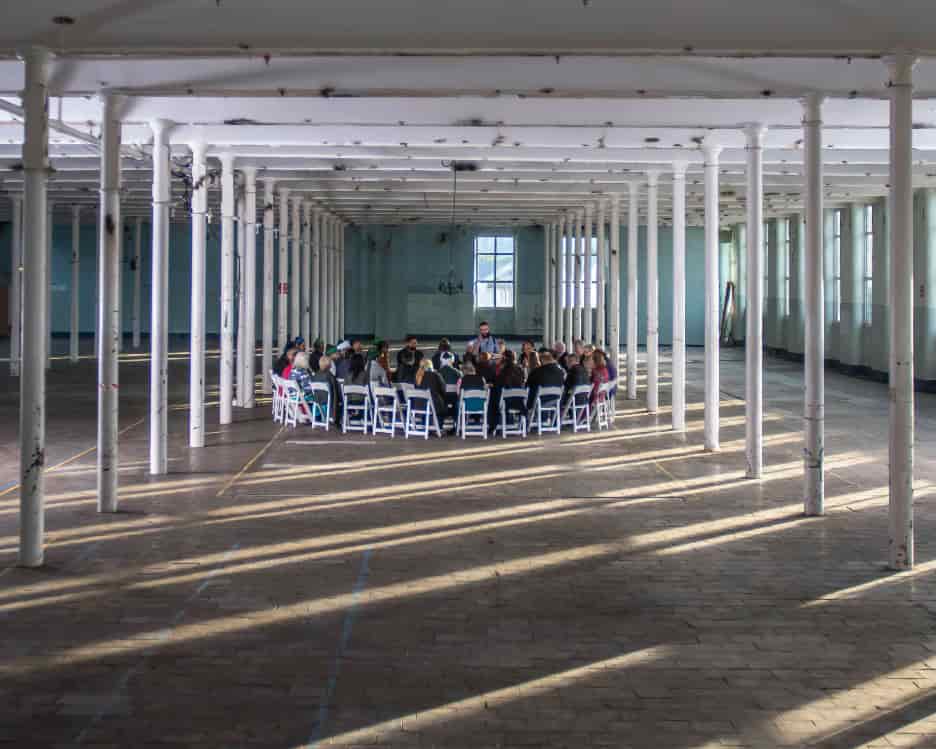
Suzanne Lacy, The Circle and the Square, 2015–17
Feature
Art Engagement
Lizzie Lloyd asks whether an artist needs to describe themselves as socially engaged in order to engage socially
The assumption remains that work made with people is, almost by definition, an act of social goodness, moral altruism and political upstanding. But how these artworks communicate, not just what these artworks communicate, needs greater attention.
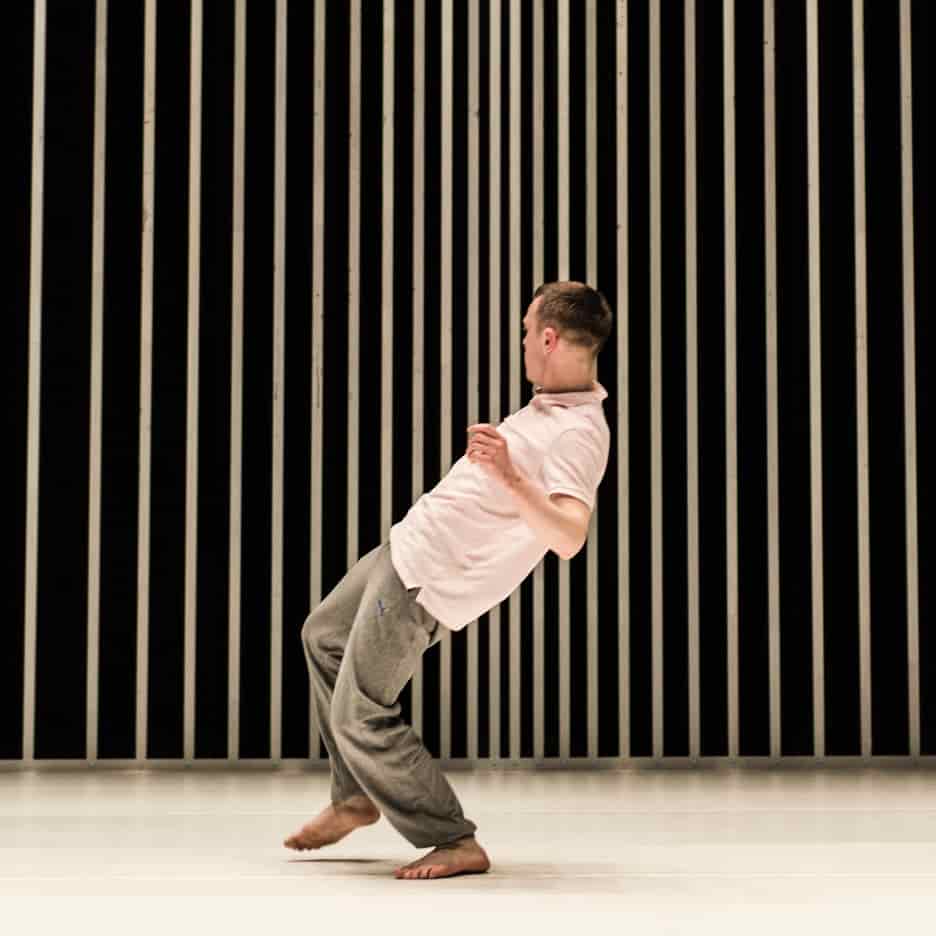
Oona Doherty, Hard to be Soft – A Belfast Prayer, 2017
Feature
Art/Class
Bob Dickinson wonders whether working-class culture can survive in the UK after continuous attack under successive Conservative governments
In this country, where many formerly strong, working-class communities have gone into decline, despite the very workplaces that neighbourhoods were built around having been long closed down or in need of drastic repair, working-class speech and imagination still survives and evolves.
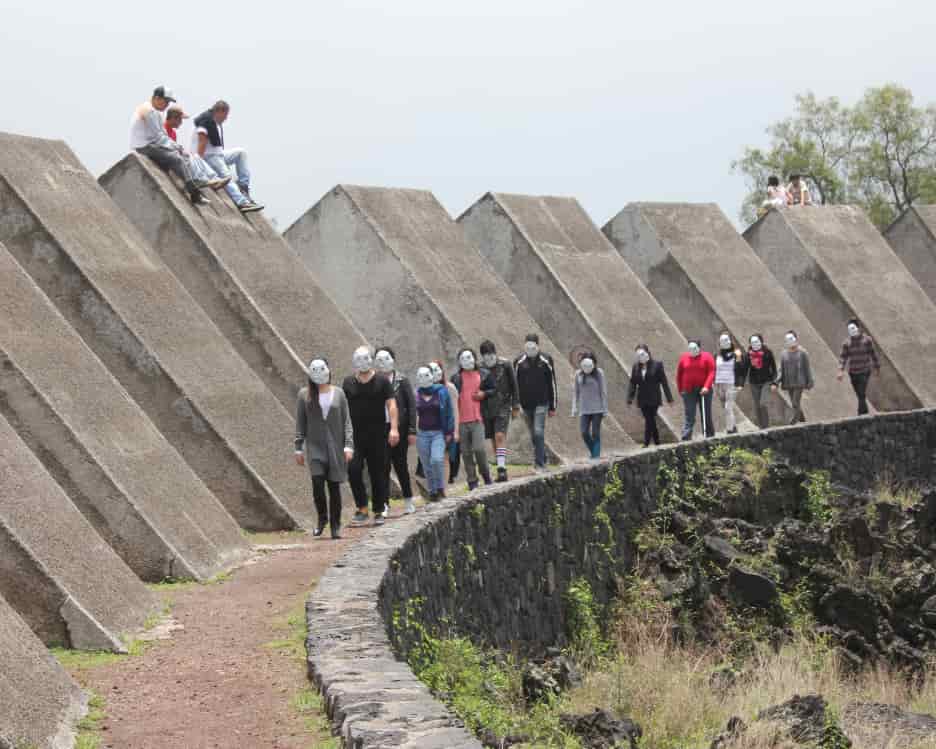
Zach Blas, Facial Weaponisation Suite, 2012–14
Profile
Zach Blas
Camille Intson
Throughout his diverse film and installation work, Zach Blas seeks to critique AI’s predictive policing, techno-security, and the progressivist philosophical underbelly of Silicon Valley through a celebration of queer resistance, escape and futurity.
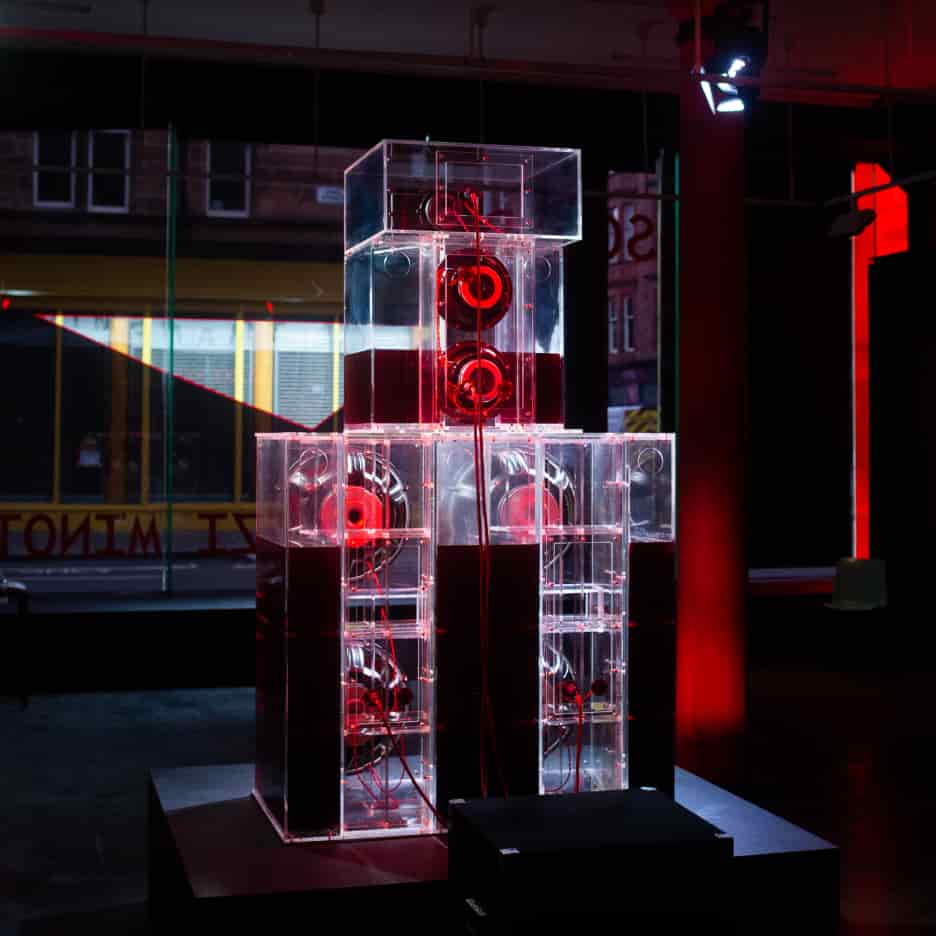
Zinzi Minott, Bloodsound, 2022
Profile
Zinzi Minott
Greg Thomas
‘Bloodsound’ included a transparent sound-system constructed of clear acrylic speakers half-filled with glycerine and red food colouring that pumped out a jarring, glitch-filled, bass-heavy form of avant-garde dancehall.
Editorial
Rights and Wrongs
The recent attempt on Salman Rushdie’s life highlights shocking intolerance around freedom of speech, an issue which is increasingly polarising and misunderstood even by its so-called champions.
John Le Carré thought it ‘impertinent’ to believe that those who wrote literature had special claims to free speech. Artists, in other words, have responsibilities as well as rights. Le Carré and Salman Rushdie were later reconciled, but the debate remains unresolved; at least the debate is still being had.
Letter
The End of Critical and Historical Studies
The Royal College of Art is cancelling its entire Critical and Historical Studies programme as part of the most extreme wave of redundancies at the college’s history.
Artnotes
Documenta Disarray
The premier international art exhibition loses its director after persistent accusations of anti-Semitism against the show; Iraqi artists pull their work from the Berlin Biennale after artist curator Kader Attia insensitively placed their work alongside photos of Abu Ghraib victims; the Museums Association warns that rising inflation will devastate the museum sector; ACE publishes its guidance on the restitution of artefacts, just as UK museums make moves to return looted Benin Bronzes; anti-oil activists glue themselves to artworks across the UK and Italy; plus the latest on galleries, people, prizes and more.
Obituary
Claes Oldenburg 1929–2022
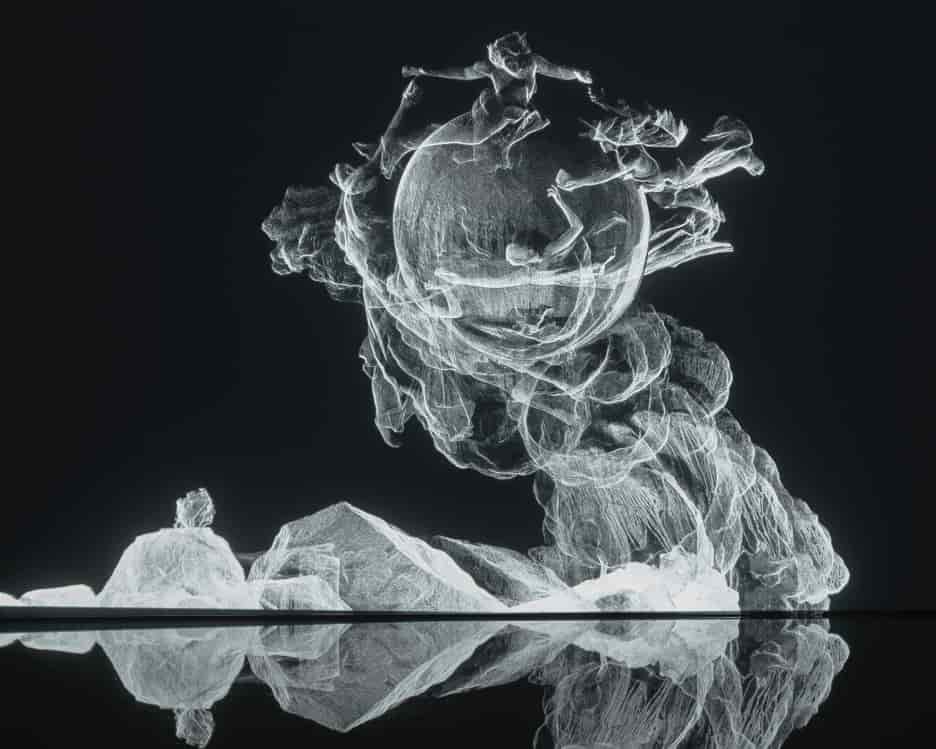
The Otolith Group, Sovereign Sisters, 2014, IMMA
Exhibitions
Elsa James: Othered in a region that has been historically Othered
Focal Point Gallery, Southend-on-Sea
Matthew Bowman
Brent Biennial: In the House of my Love
various venues, London
Gwen Burlington
The Otolith Group: Xenogenesis
IMMA, Dublin
Hana Noorali
Lou Lou Sainsbury: Earth is a Deadname
Gasworks, London
Francis Whorrall-Campbell
Tenant of Culture: Soft Acid
Camden Art Centre, London
Luisa Lorenza Corna
Moi Tran: Civic Sound Archive
Peer, London
Peter Suchin
Someone Else: The foreignness of children
Museum für Neue Kunst, Freiburg
Agnieszka Gratza
Dayanita Singh: Dancing with my Camera
Gropius Bau, Berlin
Nicola Jeffs
Transcultural Art Histories in the GDR
Albertinum, Dresden
Sara Blaylock
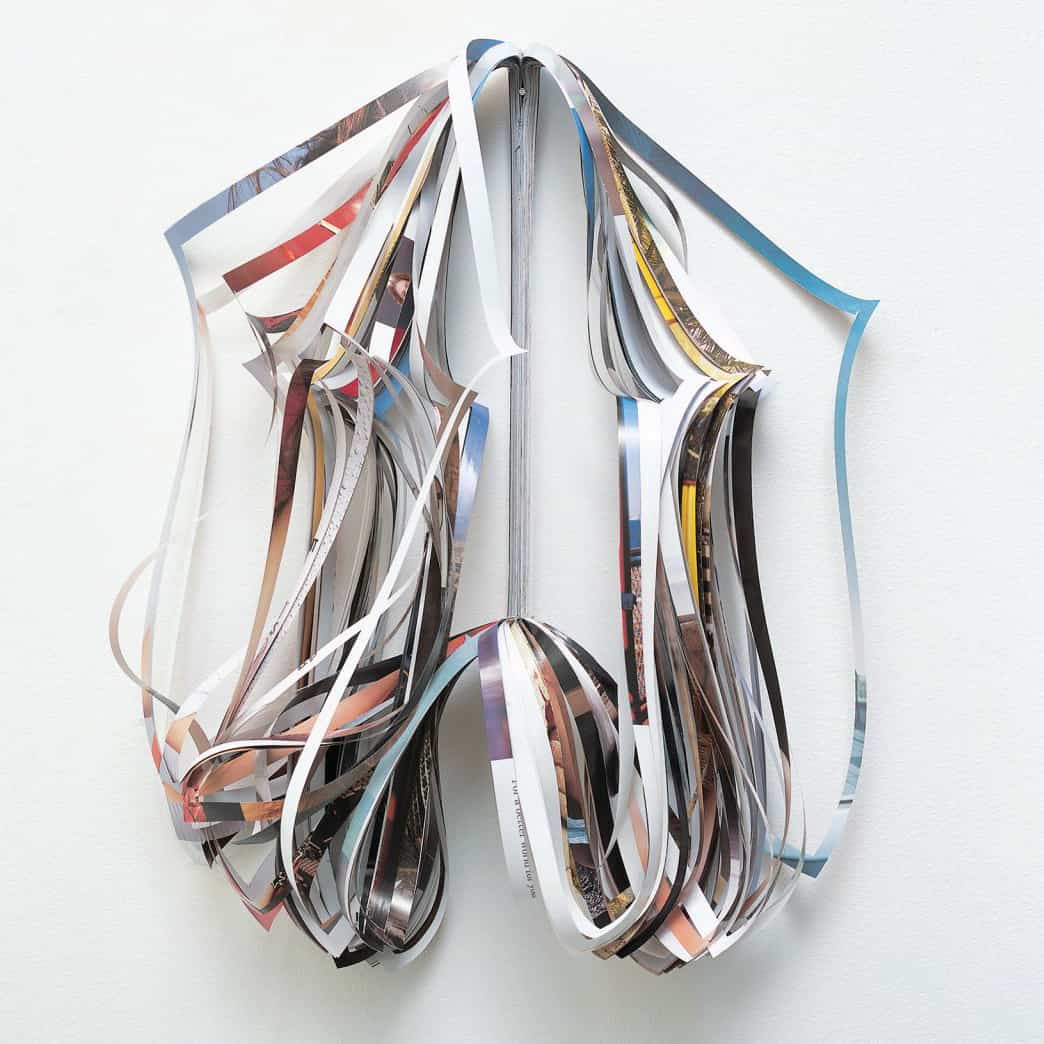
Angus Fairhurst, A magazine – everything removed except 1cm border, 2005, cover image for Against Decorum
Books
Michael Hampton: Against Decorum
Cherry Smyth
Soon, you will find yourself asking if you dog-ear, underline in pencil, biro or not at all, and if you have a visceral aversion to bending back the front cover to hold the book in one hand. Do you attempt to remove the price sticker and risk a tacky patch of glue or, worse, a torn, resolute label in grubby spot?
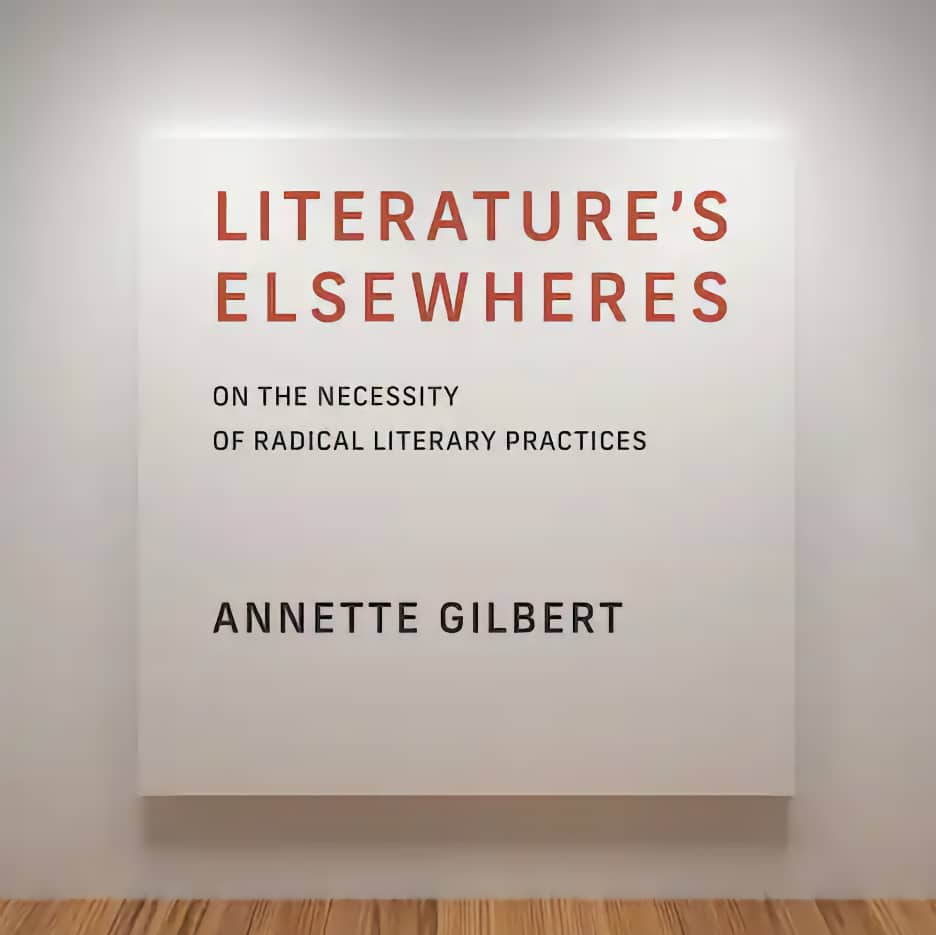
Books
Annette Gilbert: Literature’s Elsewheres – On the Necessity of Radical Literary Practices
Mark Prince
Discussing Heinz Gappmeyer’s Raum, 1977 – an empty pamphlet with the artist’s name and title in elegant sans-serif – Annette Gilbert quotes the artists’ book historian Anne Moeglin- Delcroix’s obtuse comment that ‘the emptiness of a book makes it more conceptual’, missing how the book’s loss of textual content is in inverse proportion to its gain as an object of decor or design, qualities which might be the opposite of ‘conceptual’.
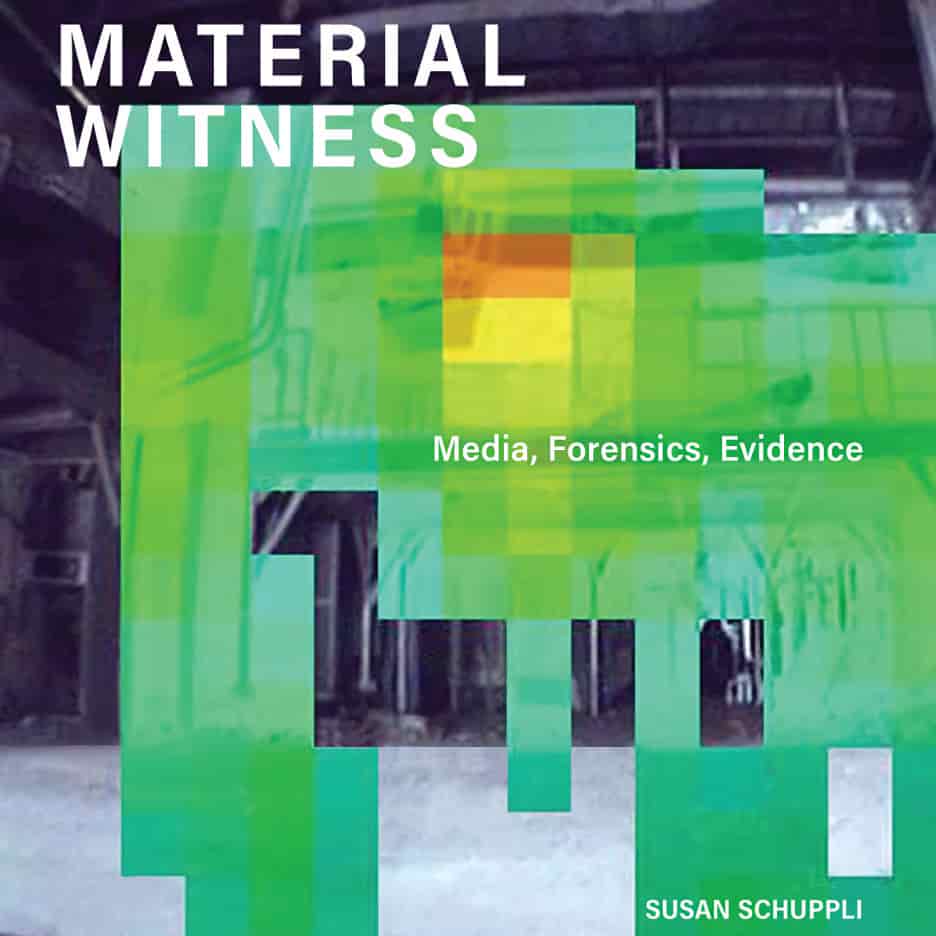
Books
Susan Schuppli: Material Witness – Media, Forensics, Evidence
Mitchell Anderson
From the discovery of radiation and photographic processes a century and a half ago, the reader encounters events, topics and technologies with varying depth: ice cores, Chernobyl, oil spills, histories of analogue recording, Watergate, Tamil Massacres, the IRA, the atrocities of the Yugoslav wars. Schuppli demonstrates that countless horrors shape our possible understandings of wider events.
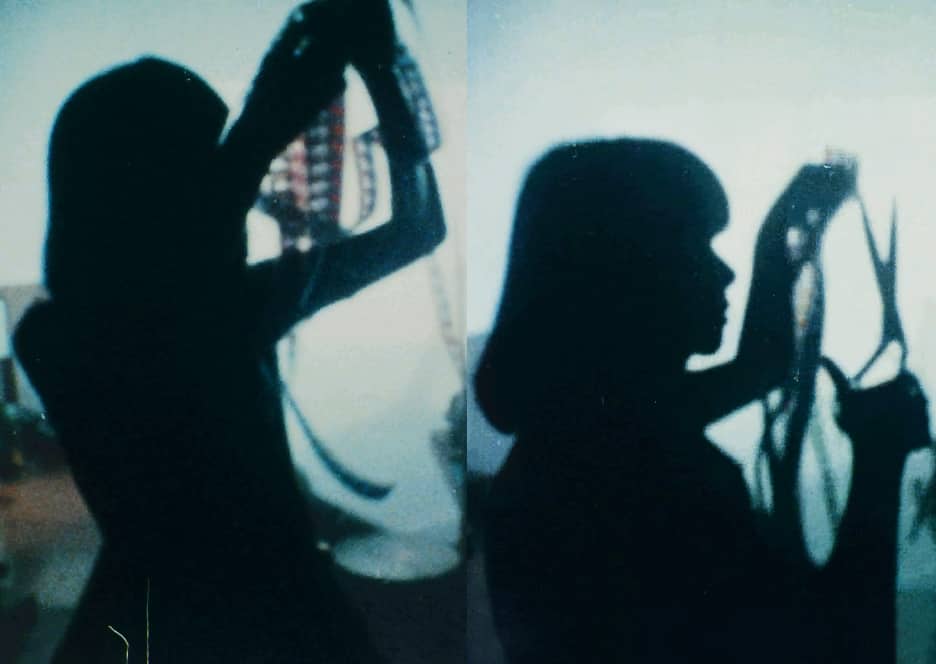
Han Ok-hee, Untitled 77-A, 1977
Film
No Master Territories: Feminist Worldmaking and the Moving Image
Mimi Howard
‘No Master Territories’ features nearly 90 non-fiction films made by feminist filmmakers from the 1970s to the 1990s. If the ‘unearthing’ of artworks implies a kind of scarcity, here, feminist filmmaking of the late-20th century appears – to the contrary – proximate, abundant and continuous.
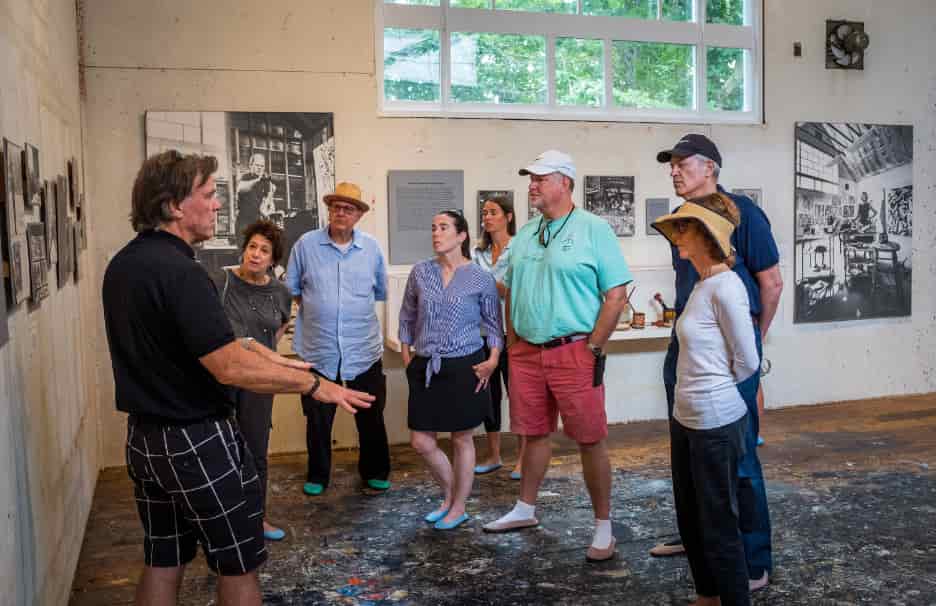
visitors to Jackson Pollock’s barn
Reports
Letter from the Hamptons
Daniel Neofetou
In Southampton and East Hampton, every punter who chances through the door is a potential client; outside galleries there are racks of free magazines, one of which is a real-estate brochure listing properties priced up to $45m.
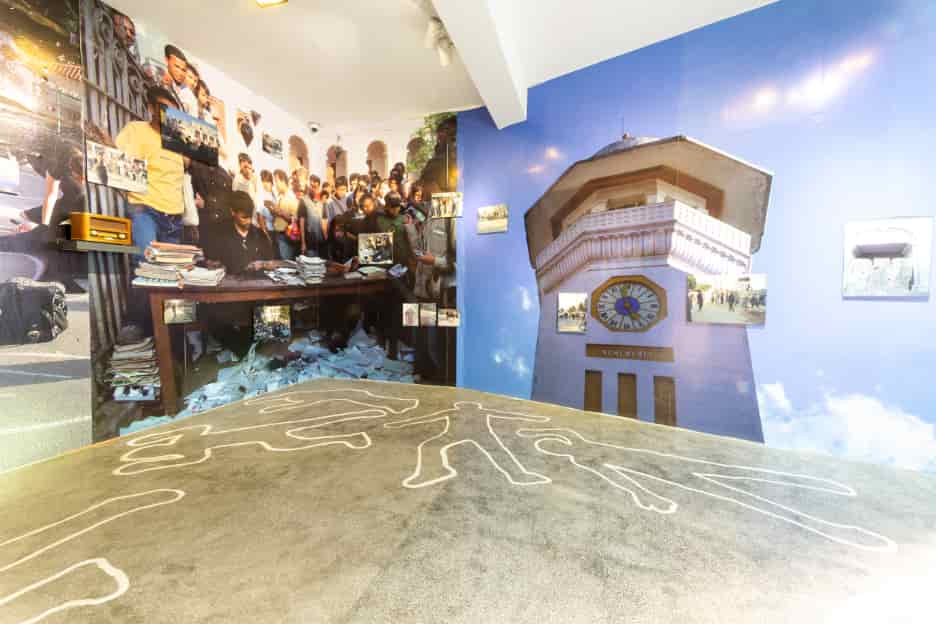
Ashmina Ranjit, Happening: Present Situation, 2004/22
Reports
Letter from Kathmandu
Beatriz Cifuentes Feliciano
The visual narratives in contemporary Nepali art often draw from folk and tantric art, and reflect on social and political issues, including freedom of expression and the rights of women and indigenous peoples.
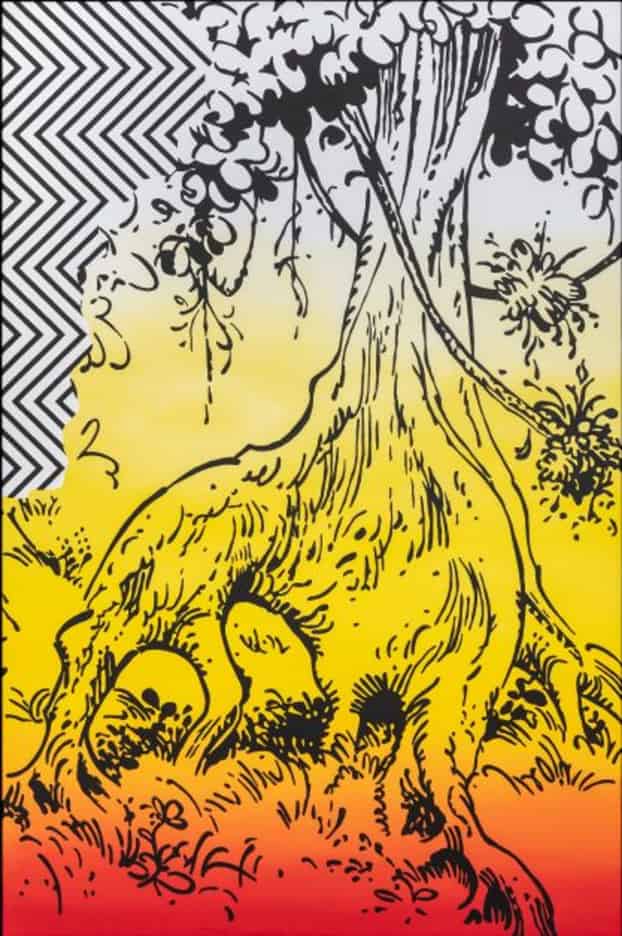
Claudia Comte, Heart of a Star (Zigzag/Jungle Series), 2022, included in the 'Women – Art in Times of Chaos’ auction
Artlaw
Selling Art Now
Henry Lydiate
Simon De Pury’s new model subverts that customary division of selling roles by offering a symbiotic market relationship between auction houses and gallerists together conducting primary sales.

